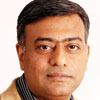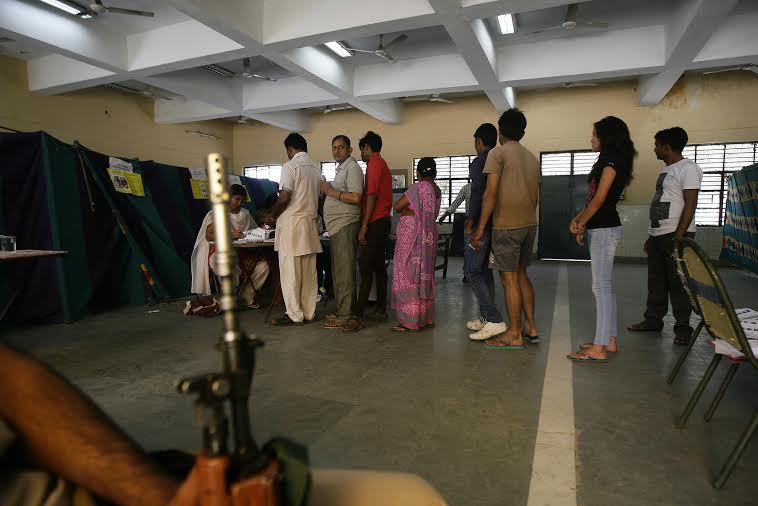Speaking in figures, there are striking similarities between the 7 constituencies in Delhi and the equal number going to the polls in Bihar today, including Patna Sahib and Patliputra. So what caused the panic in Patna while Delhi rode past the D-day so smoothly?
When I decided to book my Patna-Delhi return ticket for April 17 I never realised I was in for a shocker. “How will you reach airport? No three-wheeler or taxi will be available tomorrow, at least till 6 PM,” warned the senior journalist friend who had dropped in yesterday to meet me. “It’s polling day in Patna,” he said, even before I could ask him the reason. “And yes, you won’t get too many three-wheelers today as well after 5 pm, so make sure you are back home early today.”
The journalist also informed me that since he could not get pass for his car, that is mandatory for private vehicle owners as well, he was using his son’s motorcycle and offered me lift till Boring Road and Patliputra Colony for the two meetings that I had.
On our way to Boring Road from Kankarbagh Colony we were stopped twice – once near the famous Shalimar Sweets corner and then at the Indira Gandhi Planetarium on Dak Bunglow Road. There was a police naka, or barricade, at both places and despite the thin traffic, there was a jam. The gun-totting policemen were in element, checking documents of each vehicle. Armed with official ID cards of two media houses, our motorbike was allowed to pass without much fuss at both the places. However, we decided to stop at the second naka for a while and watch the poll tamasha.
In the 10 minutes that we stood there, the policemen seized three motorcycles and fined more than two dozen vehicles, including cars, and seized Rs 26,000 that one of the car owners was carrying. While the man pleaded that he was on his way to Kurji Holi Family Hospital and the amount was meant for treatment of his brother, he was given a seizure slip and asked to collect the money back on April 18.
During my meeting in Patliputra Colony, I was informed by another senior journalist that the owner of the local TV channel that he was working with had to cancel his trip to Begusarai because he could not arrange for a vehicle to travel. Not that he did not have a car but because all his three cars were SUVs. With demand for SUVs soaring during the election phase, he, like other owners, dreaded taking them out on road for fear of the vehicles getting seized for use by polling officials and security forces.
All this while the Patna district magistrate-cum-district electoral officer (DEO), N Saravana Kumar, had only a week ago assured citizens that the administration will not use force to hire vehicles for poll duty! Kumar had also promised that the district administration would hire, instead of requisitioning, vehicles for election duties.
With my fellow journalist’s words sending alarm signals, I decided to call it a day at 6 pm. My friend, who was headed towards Ashiana Nagar, dropped me near the Hartali Mod. “Patnaiya ho, pahunch hi jaoge” (you are from Patna, you will manage your way) he said and zipped ahead. As I waited there, I could not see a single rickshaw or three-wheeler. Yes, there were a few fellow passengers like me waiting for public transport. Fifteen minutes down the line, I decided to walk and finally got a rickshaw near the Income Tax roundabout. However, the guy said he could drop me only till the station.
The station roundabout too was deserted. Besides, there was a sense of fear among everyone – people waiting for a transport, those walking by, people on two-wheelers and three-wheeler drivers. It seemed everyone just wanted to get away from there. While a three-wheeler driver told me “mamu (local slang for police) raj hai”, a fear of the unknown could be seen in people’s body language.
This is the same place which one would hate for the chaos caused by three-wheelers on a routine day. Today, there were a few of them, but none for my destination: Kankarbagh (in Patna three-wheelers have permits to run on fixed routes and carry passengers on sharing basis). Finally, I decided to “book” a full vehicle and managed to reach home by 7:45 pm.
The experience reminded me of the just-concluded Delhi parliamentary elections on April 10. During the week that preceded the elections in the national capital I had to visit the Ajmeri Gate side of the railway station twice at odd hour, I crossed the UP Gate more than eight times to visit Indirapuram and crossed the Noida entry point twice for six consecutive days to reach my office. Except for the occasional barricade at one or two places, I never experienced this rush to run away from any of these areas or routes.
The Delhi elections went off peacefully and the security remained non-obtrusive, but all-pervasive. “This is Bihar,” my friend had quipped, when I told him the same thing. “Delhi gets the best of security and they have better facilities to manage things.”
This prompted me to quickly check for facts as soon as I was able to hook on to the internet, and the similarities are striking.
Polling for Delhi and Bihar (second phase) were being held for seven parliamentary constituencies each and while the national capital had 1.27 crore eligible voters, 1.18 crore voters were expected to participate in the second phase of Bihar polls in Patna Sahib, Patliputra, Nalanda, Jehanabad, Munger, Ara and Buxar Lok Sabha constituencies. Delhi had 150 candidates to 117 in fray in Bihar today.
Both states also compare well in terms of the logistics and security arrangements. While 11,846 polling stations were set up for the second phase of polling in Bihar, Delhi had 11,763 polling stations in 2,527 locations, of which 327 were marked as critical and 90 as hyper-critical. Delhi also had 247 auxiliary polling booths to boast of.
In terms of deployment of security forces, the seven parliamentary constituencies had 42,600 security personnel, including 152 companies of central forces and 42 companies of Bihar Military Police. Similarly, Delhi had 35,000 state police personnel, 4,000 home guards and 40 companies of central paramilitary forces, including 161 police flying squads and video surveillance teams as part of its security machinery.
So what caused the panic in Patna, and I am sure in most of the other parts of Bihar, while Delhi did not suffer even a single polling pangs? Perhaps it is time for the administrators in Bihar to think and analyse.

